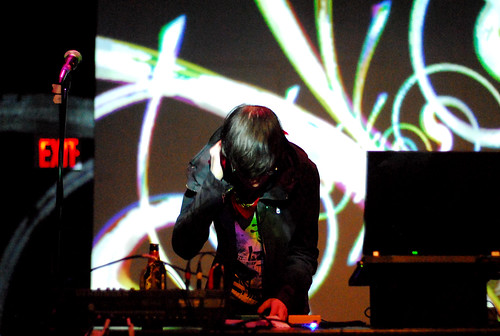Pulsewave is a monthly event held at The Tank in NYC which features "lo-bit" music, or chiptunes - music created entirely through the use of a Gameboy, Nintendo, or other device limited in some manner. Most articles that you'll come across about this technique of composition (and mind you, it's not a genre) immediately make a comparison to video game soundtracks, and use the words "bleep," "bloop," and "mario" in some sort of degrading fashion that makes nobody happy.

Being centered in Ohio, I rarely get to attend anything quite like this. The 8-bit scene flourishes primarily in New York City and San Francisco or at conventions where these musicians often meet (MAGFest, being one such example). I was lucky enough to see my friend Zen Albatross perform a live set that absolutely blew me away, and of the three featured artists I found his music most engaging. Also performing was a vivacious musician named Minusbaby, who managed to blow the sound system, and another Active Knowledge, who did some exciting covers that resonated with my internal love for pop music (Lady GaGa, Of Montreal).
I'm no expert on the artform, but seeing what other musicians are doing around the country is extremely exciting, especially when its done in a way that presents my childhood in a burning flame of nostalgic discharge and hurls it at my face. If you're interested in checking out Chiptunes, a good start might be Shael Riley and the Double Ice Backfire, which combines chip and pop, or if you like your hiphop roots go for A_Rival from San Francisco. If you want to jump right in, I can only recommend Zen Albatross. Also, start googling Jake Kaufman (virt), Minusbaby, Nullsleep, Bit-shifter, Inverse Phase, ....... (zzz). The genres expressed are limitless, find your own preferences and begin leveling up. Ico Bukvic will start rolling around with stomach aches.

